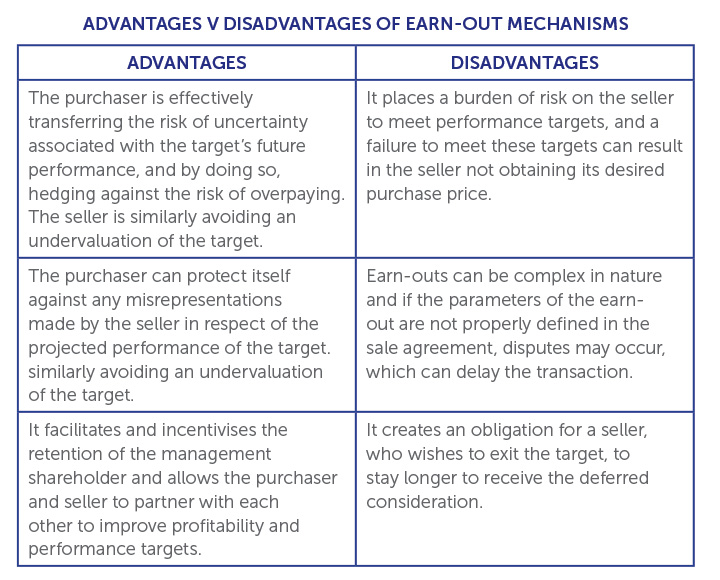Earn-out to earn big: Understanding earn-out mechanisms
At a glance
- An earn-out mechanism is a contractual arrangement commonly used in acquisitions where a portion of the purchase consideration is paid at closing, and an additional amount (earn-out) is paid in the future if certain conditions or financial performance thresholds are met.
- Earn-outs are often used in private equity transactions to retain and incentivize management shareholders and ensure the target's continued profitability. The better the target's financial performance, the larger the deferred consideration for the seller.
- The duration of an earn-out varies depending on factors like transaction complexity and regulatory environment. Typically, earn-outs range from one to three years. The duration is determined based on the purchaser's risk assessment of the target's financial performance, with longer periods for higher uncertainty and vice versa.
Earn-outs are commonly used in private equity transactions, to retain and incentivise the management shareholder, and after the closing of a transaction, to ensure that the target continues to be profitable and meets the agreed performance thresholds. In return for meeting the thresholds, the management shareholders are incentivised and “earn” the payment of the deferred consideration. Normally, the parties agree that the better the financial performance or the target, the larger the deferred consideration the seller will receive.
Duration of an earn-out mechanism
Earn-outs are mostly dependent on the future performance of the target and the duration varies from transaction to transaction. There are many variables that are considered, such as the complexity of the transaction, the nature of the target’s business, or the regulatory environment in which it operates, but ultimately the duration of an earn-out mechanism is dependent on the outcome of the purchaser’s risk assessment of the target’s financial performance. Generally, the duration of earn-outs range between one and three years. From a purchaser’s perspective, if there is uncertainty regarding factors that may negatively impact the future financial performance of the target, the purchaser would try and negotiate a longer earn-out period and vice versa.
Calculation of the earn-out
The calculation of the purchase consideration by way of an earn-out mechanism benefits the purchaser, and in most cases, also the seller, as it allows the parties to purchase and sell the target for its true worth. This prevents parties from being overcharged or undercut by one another.
The earn-out will usually be calculated with reference to financial metrics such as the profits, sales, or net asset value of the target. It is critical that these provisions be set out in the sale agreement in sufficient detail, to avoid disputes regarding the calculation of the earn-out. The parties will typically agree to appoint an auditor or accountant to calculate the earn-out. If, for example, the buyer’s auditor calculates and certifies the earn-out, then the seller should be given the opportunity to review the calculation. Where parties fail to agree on the calculation of the deferred consideration, the sale agreement should make provision for such disputes to be referred to an independent expert who will make a fair determination.

The information and material published on this website is provided for general purposes only and does not constitute legal advice. We make every effort to ensure that the content is updated regularly and to offer the most current and accurate information. Please consult one of our lawyers on any specific legal problem or matter. We accept no responsibility for any loss or damage, whether direct or consequential, which may arise from reliance on the information contained in these pages. Please refer to our full terms and conditions. Copyright © 2026 Cliffe Dekker Hofmeyr. All rights reserved. For permission to reproduce an article or publication, please contact us cliffedekkerhofmeyr@cdhlegal.com.
Subscribe
We support our clients’ strategic and operational needs by offering innovative, integrated and high quality thought leadership. To stay up to date on the latest legal developments that may potentially impact your business, subscribe to our alerts, seminar and webinar invitations.
Subscribe



